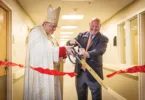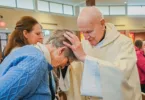The challenge of building a culture of life
By Cardinal Justin F. Rigali
Special to The Leaven
The effort to restore legal protection for unborn children faces new challenges, as we deal with a new administration and Congress that support “abortion rights.” Many are asking: Where do we go from here?
We first need to recall why we are here, why we Catholics became involved in these tough battles. We begin with the dignity of each human person.
Each and every one of us has intrinsic and immeasurable worth. That is because God created each of us in his image by the outpouring of his infinite and unconditional love. In return, he asks only that we share that love with others, beginning with those most in need — the poor, vulnerable, and despised of this world.
This intrinsic God-given human dignity is the basis for all inalienable human rights — beginning with the most basic right: the right to life. It is most basic because it is the condition for all the others. First we must live, then we can talk about living well.
The right to life is the core element of other rights. All other earthly rights involve something more than life itself — but without life, they are nothing.
That “something more” is vitally important. The defense of life reaches its fullness when it expands to defend the entire range of human flourishing. This is all one vision, and ultimately one issue — the dignity of the human person. In the words of St. Irenaeus, “Gloria Dei vivens homo” — “The glory of God is man fully alive.”
To keep that vision constantly before our eyes, to remember why we are here and to gain the strength to move forward, we need to begin all our efforts with prayer.
In defending the right to life, our first duty is to oppose the direct taking of innocent human life — any human life, at any stage. As Pope John Paul II confirmed in his encyclical, “The Gospel of Life”: “the direct and voluntary killing of an innocent human being is always gravely immoral” (no. 57). Abortion and euthanasia are preeminent concerns of the church for reasons that are intrinsic to these issues, as well as reasons that are situational.
Intrinsically, these acts always constitute the direct taking of a human life when it is most innocent and defenseless. And they are willed and carried out by those most called to defend human life — members of the healing professions and of one’s own family. To undermine these two havens of life is to make a culture of life impossible.
Situationally, these issues are the places where those committed to a conditional and selective vision of human rights have planted their flag in our time. They want to draw lines between the important and unimportant members of society, between persons and “nonpersons.” In a different time or place, the forcing issue might be slavery, racism or anti-Semitism; today, abortion and related issues force us to decide whether we mean what we say in speaking of inalienable human rights, inherent in simply being human.
In particular, the Supreme Court’s 1973 Roe v. Wade decision has made abortion the battleground over our tradition of inherent human rights and has polarized our society as nothing else has. Later efforts to use law as a weapon against other innocent human lives — against newborn children with disabilities, for example, or against the sick and elderly through a “right” to assisted suicide — have cited Roe as their inspiration and precedent.
Thus, in promoting a culture of life, we must give priority to defending innocent unborn boys and girls from direct attack. We must also make it clear how this effort stands for the dignity and well-being of everyone, before and after birth.
In defending conscience rights in health care, for example, we stand with the unborn child and also with the women and men of our healing professions whose freedom of conscience is at risk — and with women who will lose access to basic life-affirming health care if those who truly care about them and their children are forced out of medicine.
In sending tens of millions of postcards to Congress against the radical “Freedom of Choice Act,” we have helped stop extreme legislation that would treat ready access to abortion as a goal overriding respect for unborn children or for the well-being of pregnant women.
By insisting that the federal government promote only morally sound stem-cell research, we defend the life of embryonic children — and also the health of patients endangered by the many risks of attempted embryonic stem-cell treatments and the health of women whom some want to exploit as “egg factories” for attempts at cloning human embryos for stem cells.
And the “Pregnant Women Support Act” will provide a wide range of assistance so women can bring their children to live birth and receive a helping hand as they parent the child or make an adoption plan.
Of course, helping those in need is not only the task of government. The dedicated efforts of Catholics at pro-life pregnancy centers, maternity homes, hospitals, retirement homes, and parish-based support networks for pregnant women and children, as well as prayer and assistance efforts outside of abortion facilities, are needed now more than ever.
Our task is to change hearts and minds, including our own. All our good works in the areas of public policy, education and pastoral care must be undergirded by our prayers and sacrifices offered up to the Lord of Life. Through his saving power, and with the prayerful intercession of our Blessed Mother, we can build a culture of life.
The defense of human life at its most vulnerable stages is an essential duty of those inspired by the Gospel. Our prayers and efforts in this cause should open us up to defending the rights and meeting the needs of human beings all along life’s spectrum. Having said “no” to attacks on innocent human life, we need to affirm a great “yes” to the full range of human living and flourishing.
Cardinal Justin F. Rigali is archbishop of the Archdiocese of Philadelphia and chairman of the USCCB Committee on Pro-Life Activities.






